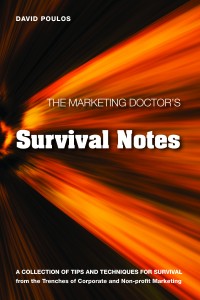I thought readers would appreciate this – I’m as guilty as anyone of using these verbisms, especially being close to the inside at Xerox and a couple of the other larger brands in a couple of industries. Its interesting to see the differences in which one gets picked for this “honor” – we text and call people, and we phone people, we don’t iPhone them, no matter that they are the market leader. But when the telephone was not the only device that performed this function in the early days of communication technology, the telephone won the market and, became the generic term. Kleenex also experienced this as the dominant player in the disposable tissue market, but we still blow our noses or wipe up, we don’t “kleenex” our noses. No verbism, but still the market leader becomes the default term for the category.
Good article, enjoy the read . . .
By Mike Hoban
TiVo. FedEx. Taser. Velcro. Superglue. Sometimes consumers latch onto a brand and make it a verb–the question is whether it helps or hurts a brand.
We FaceTime and Skype but we generally don’t Facebook or YouTube. We Google but we don’t Bing (at least not yet). We Rollerblade but we don’t Slinky. In past years, we would Xerox but would never Polaroid. Why are some popular brands or products used as verbs in our everyday conversation and others not?
It’s an interesting question and there are opposing sides in the business world about whether “verbifying” (which is a verbified word in itself) a brand or product is a good thing or not. On the one hand, the marketers tend to believe it’s the ultimate compliment and demonstrates a personal connection between consumer and brand. The intellectual property attorneys, on the other hand, usually contend that using a product or brand name this way risks what is termed “genericide,” (as Dave Barry used to say, “I’m not making this up…”) meaning losing the legal power of a trademark. Xerox, for example, for several years apparently ran a campaign with publishers asking them to not use the name “Xerox” as a verb when the generic term “photo copy” was the intended meaning. A much referenced 2009 New York Times article describes the opposing views.
TiVo. FedEx. Taser. Velcro. Superglue. Sometimes we consumers just latch onto a dominant brand and verbify it with no mind or care about whether the company wants us to or not. But it’s not clear why this happens to some products but not to others, even if they have similar product characteristics. Why do many people use the verb “Photoshop” (a product by Adobe) to mean any type of digital image manipulation but we don’t use “Word” (a product by Microsoft) as a verb to mean any type of word processing?
Technically, the etymologists refer to the practice of verbing as “anthimeria,” which means a functional shift or conversion of word use, and it’s not a new phenomenon. Shakespeare was a serial verber, for instance. It can be creative and clever but in the business world it is abused and can become buzzword-speak. We ballpark, we partner, we value-add, eyeball, fast track, leverage, and we green-light. And in meetings we flip chart. But the line must be drawn somewhere. People using “dialogue” as a verb, for instance, should be formally reprimanded and the use of “architect” as a verb should be grounds for termination.
Oh, sorry about the little rant. We were talking about brands being verbified and perhaps the first brand to do that consciously as part of its marketing strategy is Simoniz, the car wax. Back in the 1920s or ’30s the company’s tagline was “Motorist wise, Simoniz” and posters and ads from that period would exhort car owners to “Simoniz Now!” Similarly, having grown up in Michigan in the 1960s and 1970s, we would routinely use the brand Ziebart as both a noun and a verb (“Did you Ziebart your new car yet?”) to refer to any car rustproofing process (there’s that genericide bugaboo again).
Sometimes companies’ efforts to “verb up” their brands fail or fizzle. Back in the 1970s I recall a campaign by the grocery chain Kroger which featured a jingle that sang out “Let’s go Krogering, Krogering, Krogering…” Let’s just say that ad was soon retired. And Yahoo several years ago asked people “Do you Yahoo?” Yahoo no longer asks that question and seems to be content to remain a noun.
Brand verbification. What do you think will be the next one to enter our everyday lexicon–and does it help or hurt a brand?
–Mike Hoban is a management consultant in his day job and can be contacted at business-at-large@sbcglobal.net.
For more insights like these, be sure to pick up your copy of “The Marketing Doctor’s Survival Notes”





